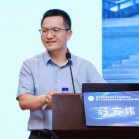Areas of Focus
- Cell cycle and mitosis
- Chromosome biology
- Genomic stability
Work Experience
- 1997 - 2003, Teacher at Zhejiang University
- 2011 - 2013, Lecturer at Harvard Medical School
- From November 2012, Professor and Doctoral Supervisor at Zhejiang University
Academic Background & Achievements
- 1993 - 1997, Bachelor's Degree: Zhejiang University
- 1999 - 2002, Master's Degree: Zhejiang University
- 2003 - 2006, PhD: Tokyo University of Agriculture and Technology
- 2006 - 2011, Postdoctoral Research: Harvard Medical School
Publications
- Histone H3 Thr-3 phosphorylation by Haspin positions Aurora B at centromeres in mitosis, Fangwei Wang, 2010
- A positive feedback loop involving Haspin and Aurora B promotes CPC accumulation at centromeres in mitosis, Fangwei Wang, 2011
- Haspin inhibitors reveal centromeric functions of Aurora B in chromosome segregation, Fangwei Wang, 2012
- Histone modifications and mitosis: countermarks, landmarks and bookmarks, Fangwei Wang, 2013
- Polo-like kinase-1 triggers histone phosphorylation by Haspin in mitosis, Fangwei Wang, 2014
- The N-terminal non-kinase-domain-mediated binding of Haspin to Pds5B protects centromeric cohesion in mitosis, Fangwei Wang, 2017
- A kinase-dependent role for Haspin in antagonizing Wapl and protecting mitotic centromere cohesion, Fangwei Wang, 2018
- HP1 links centromeric heterochromatin to centromere cohesion in mammals, Fangwei Wang, 2018
- WAC promotes Polo-like kinase 1 activation for timely mitotic entry, Fangwei Wang, 2018
- A positive feedback mechanism ensures proper assembly of the functional inner centromere during mitosis in human cells, Fangwei Wang, 2019
- Aurora B kinase activity-dependent and -independent functions of the chromosomal passenger complex in regulating sister chromatid cohesion, Fangwei Wang, 2019
- Histone H2A phosphorylation recruits topoisomerase IIα to centromeres to safeguard genomic stability, Fangwei Wang, 2020
- Centromere-localized Aurora B kinase is required for the fidelity of chromosome segregation, Fangwei Wang, 2020
- Bub1 and CENP-U redundantly recruit Plk1 to stabilize kinetochore-microtubule attachments and ensure accurate chromosome segregation, Fangwei Wang
- The cGAS-STING pathway: a therapeutic target in chromosomally unstable cancers, Fangwei Wang
Awards
- 2010, BWH Research Excellence Award, Harvard Medical School
- 2011, Outstanding Chinese Life Scientist of the Year, Harvard Medical School
- 2012, National High-level Personnel of Special Support Program
- 2013, Distinguished Young Scholar, Zhejiang Province
- 2015, Newton Advanced Fellowship, Royal Society, UK
- 2020, National Science Fund for Distinguished Young Scholars
- 2020, Outstanding Research Award, Zhejiang University
- 2023, Second Class Prize in Natural Science, Zhejiang Province (First Author)





